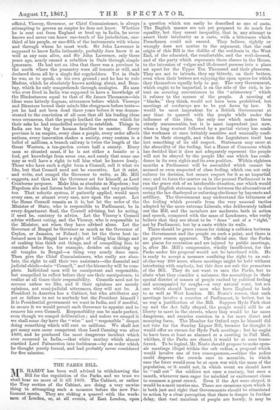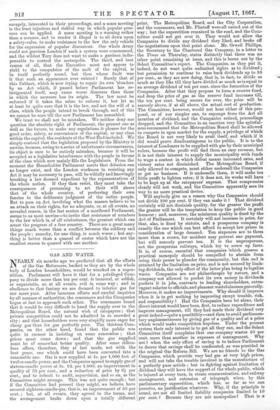THE PARKS BILL. 'tjR . HARDY has been well advised in
withdrawing the Bill for the regulation of the Parks, and we trust we shall hear no more of it till 1869. The Cabinet, or rather the Tory section of the Cabinet, are doing a very unwise thing in attempting such a measure before the new Par- liament meets. They are risking a quarrel with the work- men of London, or, at all events, of East London, upon a question which can easily be described as one of caste. The English masses are not yet prepared to do much for equality, but they resent inequality, that is, any attempt to assert their inferiority as a caste, with a bitterness which Frenchmen could not exceed. They believe, rightly or wrongly does not matter to the argument, that the real origin of this Bill is the dislike of the residents in the West End, of the educated, the comfortable, and the well-dressed, and of the party which represents these classes in the House, to the intrusion of vulgar and ill-dressed persons into a place set apart for the Upper Ten Thousand and their pleasures. They are not to intrude, they say bitterly, on their betters, even when their betters are enjoying the open spaces for which they themselves equally help to pay. The very Government, which ought to be impartial, is on the side of the rich, is in- tent on securing conveniences to the " aristocracy " which it refuses to the masses of the people. A meeting of "blacks," they think, would not have been prohibited, but meetings of corduroys are to be put down by law. It would be most imprudent for a British Government at any time to quarrel with the people while under the influence of this idea, the only one which makes them utterly unreasonable, but it is most imprudent just now, when a long contest followed by a partial victory has made the workmen at once irritably sensitive and unusually confi- dent in their strength, and when the Legislature itself has lost something of its old respect. Statesmen may sneer at the absurdity of the feeling, but a House of Commons which has decided that it does not adequately represent the people will not be obeyed by the people like one which has confi- dence in its own rights and its own position. Within eighteen months a Parliament will be assembled which cannot be accused or even suspected of class feeling, which can not only enforce its decision, but secure respect for it as an impartial one; and to force the matter on in the present Parliament is to run the grave risk of an intolerable situation, one which would compel English statesmen to choose between the alternatives of seeing the law disobeyed or enforcing obedience by bayonets and artillery. The Government may understand the bitterness of the feeling which prevails from the very unusual tactics adopted by the more extreme Liberals, who deliberately talked out the Bill, and the members are moderate, both in action and speech, compared with the mass of Londoners, who verily believe that they are about to be " done " out of a "right," not by Parliament, but by a caste within its walls.
There should be grave reason for risking a collision betkeen the Government and the people on such a point, and there is no grave reason apparent. The official one, that the Parks are places for recreation and are injured by public meetings, is, after Mr. Mill's compromise, wholly insufficient, for the Parks under his proposal would not be interfered with. He is ready to accept a measure confining the right to an out- of-the-way 200 acres, where meetings might be held without interfering with anybody, but this does not suit the promoters of the Bill. They do not want to save the Parks, but to abate what they consider a nuisance, the assemblage in their special district of masses of people excited by political feeling and accompanied by roughs—a very natural want, but not one which should hurry men who have England to look to as well as West London. Mr. Neate's reason, that such meetings involve a coercion of Parliament, is better, but in no way a justification of the Bill. Suppose Hyde Park shut up and the Act fully obeyed, the people would still be at liberty to meet in the streets, where they would be far more dangerous, and exercise coercion in a far more direct and annoying form. The Member for Oxford says he himself did not vote for the Sunday Liquor Bill, because he thought it would offer an excuse for Hyde Park meetings ; but he ought to have been at least as alarmed at a meeting in Pall Mall, whither, if the Parks are closed, it would be at once trans- ferred. To be logical, Mr. Neate should propose to make open- air meetings illegal within the cab radius, a proposal which would involve one of two consequences,—either the police could disperse the crowds sure to assemble, in which case the force would soon be at open war with the mass of the population, or it could not, in which event we should have to "call out" the soldiers not once a century, but once a month, whenever men eager for mischief or excitement chose to summon a great crowd. Even if the Act were obeyed, it would be a most unwise one. There are occasions upon which it is both just and right that Governments should be stimulated to action by a clear perception that there is danger in further delay, that vast numbers of people are keenly, it may be savagely, interested in their proceedings, and a mass meeting is the least injurious and riskful way in which popular pres- sure can be applied. A mass meeting is a warning rather than a menace, and to render it illegal is to sit down upon a safety-valve, to make resistance to the law the only vehicle for the expression of popular discontent. Our whole Army could not garrison London if such a system were commenced, and the wildest Tory does not want to make a garrison indis- pensable to control the metropolis. The third, and best reason of all, that the Executive must not appear to yield to the compulsion of the mob of the capital, is in itself perfectly sound, but then whose fault was it that such an appearance ever existed ? Surely that of this Cabinet, which is how trying to repair its own blunders by an Act which, if passed before Parliament has re- invigorated itself, may cause worse disasters than those in which the measure has its origin. The law must be enforced if it takes the sabre to enforce it, but let us at least be quite sure that it is the law, and not the will of a class, which the people intend to break through, and of this we cannot be sure till the new Parliament has assembled.
We trust we shall not be mistaken. We neither deny nor question the absolute right of Parliament, the present one as well as the future, to make any regulations it pleases for the good order, safety, or convenience of the capital, or any class within the capital, the residents of the West End included. We simply contend that the legislation proposed by the Ministry is unwise, because, owing to a series of unfortunate circumstances, its object is sure to be entirely mistaken, because it will be accepted as a legislative interference with the people in favour of the class which now mainly fills the Legislature. From the moment the Householder Parliament meets that delusion can no longer exist, and the London workmen in resisting any Act it may be necessary to pass, will be wilfully and knowingly breaking a law deemed expedient by the representatives of the whole nation. If they then resist, they must take the consequences of presuming to set their will above that of the whole country, of preferring their own fancies to the deliberate judgment of the entire people. But to pass an Act involving what the masses believe to be an attack on their rights, for no adequate, or, at all events, no revealed reason, in the last session of a moribund Parliament, seems to us most unwise—to invite that resistance of numbers to the law which is, of all misfortunes, the greatest which can arrest the progress of a free country. There are a great many things much worse than a conflict between the soldiery and the people ; anarchy, for one thing, is much worse ; but any- thing is better than a quarrel of castes which have not the smallest reason to quarrel with one another.































 Previous page
Previous page